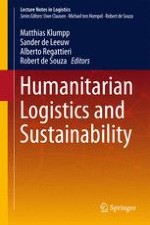2015 | OriginalPaper | Chapter
3. A Planning and Decision-Making Framework for Sustainable Humanitarian Logistics in Disaster Response
Author : Richard Oloruntoba
Published in: Humanitarian Logistics and Sustainability
Publisher: Springer International Publishing
Activate our intelligent search to find suitable subject content or patents.
Select sections of text to find matching patents with Artificial Intelligence. powered by
Select sections of text to find additional relevant content using AI-assisted search. powered by
